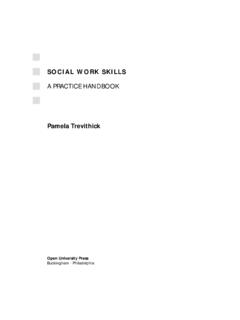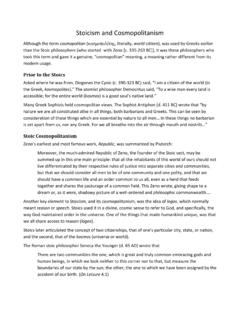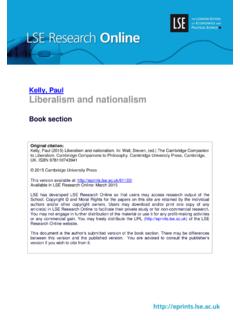Transcription of 1 CULTURAL CITIZENSHIP - McGraw-Hill Education
1 1 cultural citizenship . Recent debates within CULTURAL studies and CITIZENSHIP studies might suggest that culture and CITIZENSHIP have little in common. The term culture' is usually associated with a mix of public and private institutions, including museums, libraries, schools, cinemas and the media, while more specifically being connected with the dialogic production of meaning and aesthetics through a variety of practices. CITIZENSHIP , on the other hand, is more often thought to be about membership, belonging, rights and obligations. In institutional terms the terrain of CITIZENSHIP is usually marked out by abstract legal definitions as to who is to be included and excluded from the political com- munity. Yet whether we are talking about the risk society, network capitalism or the concerns of social movements, ideas of symbolic challenge and exclusion remain central.
2 The power to name, construct meaning and exert control over the flow of information within contemporary societies is one of today's central structural divisions. Power is not solely based upon material dimensions, but also involves the capacity to throw into question established codes and to rework frameworks of common understanding. This means that the locus of CULTURAL CITIZENSHIP will have to occupy positions both inside and outside the formal structures of administrative power. To talk of CULTURAL CITIZENSHIP means that we take questions of rights and responsibilities far beyond the technocratic agendas of mainstream politics and media. That is to say, we seek to form an appreci- ation of the ways in which ordinary' understandings become constructed, of issues of interpretative conflict and semiotic plurality more generally. In other words, how do questions of entitlement and duty relate to the diversity of culture evident within everyday life, and what is the relationship between an CULTURAL CITIZENSHIP | 5.
3 Increasingly symbolic' society and the practice of politics? What modes of exclusion become apparent within an information society? These concerns point to an age where our definitions of CITIZENSHIP and society more generally are being transformed. Which community we owe our loyalties to, what foods are safe to eat, how important is the nation as opposed to more global concerns and how I might decide upon my sexuality all increasingly involve CULTURAL questions. How we address these issues will depend upon shifting discourses and narratives that have become available to us in a variety of social contexts. As Castells (1997: 359) puts it, the sites of this power are people's minds'. Indeed, one of the central issues the book will seek to address is how we might provide fertile ground for what I shall call the cosmo- politan imagination.
4 Many in the social sciences have neglected the idea of the imagination. Castoriadis (1997) has argued that all societies are dependent upon the creation of webs of meaning that are carried by society's institutions and individuals. Society, then, is always a self-creation that depends upon norms, values and languages that help to give diverse societies a sense of unity. The imaginary' is a social and historical creation, and serves to remind us that society must always create symbolic forms beyond the purely functional. Cosmopolitanism is a way of viewing the world that among other things dispenses with national exclusivity, dichotomous forms of gendered and racial thinking and rigid separations between culture and nature. Such a sensibility would be open to the new spaces of political and ethical engagement that seeks to appreciate the ways in which humanity is mixed into intercultural ways of life.
5 Arguably, cosmopolitan thinking is concerned with the transgression of boundaries and markers, and the development of an inclusive CULTURAL democracy and CITIZENSHIP . Yet cosmopolitanism is not only concerned with intermixing and the ethical relations between the self and the other, but seeks an institutional and political grounding in the context of shared global problems. A concern for cosmopolitan dimensions will inevitably seek to develop an understanding of the discourses, codes and narratives that make such political understandings a possibility. As Lawrence Grossberg (1992: 64). has argued, no democratic political struggle can be effectively organized with- out the power of the popular'. However, before moving on to such questions it is important to try to understand how issues of culture and CITIZENSHIP became caught up with each other.
6 Here I will argue that we need to consider the development of questions of CULTURAL CITIZENSHIP within the contours of a shared information society. The emergence of such a society requires not only that we rethink our notions of culture and CITIZENSHIP , but also that we seek to develop a new understanding of contemporary social transformations. 6 | CULTUR AL CITIZENSHIP . T. H. Marshall and Raymond Williams: a CULTURAL CITIZENSHIP ? The idea of CITIZENSHIP evokes a political tradition that is concerned to debate the involvement of individuals in shaping the laws and decisions of society. It has, however, only been in modern times that this has come to include people outside of a narrow class of educated property owners. While CITIZENSHIP '. has come to mean something different in, say, Iran, Chile and Britain, here I want to concentrate upon the meanings that have become connected to the term in North America and Europe.
7 More recently, it has been the under- standings that have become connected to the late T. H. Marshall's (1992) book CITIZENSHIP and Social Class that have had the greatest impact on ongoing debates. T. H. Marshall (1992), as is well known, was concerned with the historical development of civil, political and social rights in the British national con- text. Marshall drew attention to the contradiction between the formations of capitalism and class, and the principle of equality enshrined within the granting of basic rights. Such a view of CITIZENSHIP was hardly surprising given that Marshall was writing in the 1940s and 1950s, when identity and social conflicts were dominated by class. The setting up of the welfare state, the possibility of full male employment, the nuclear family, the dominance of the nation-state and the separation between an elite literary culture and a popular mass culture all inform his dimensions of CITIZENSHIP .
8 Marshall perceived that the principle of civil and political rights had been granted in the eighteenth and nineteenth centuries, whereas the twentieth century had seen the acceptance of the idea of social rights. As many of Marshall's critics have pointed out, however, questions of civil and political rights are far from settled, and social rights were threatened once the post-war compromise between capital and labour came under attack (Roche 1994). Further, Turner (1994) argues that the postmodernization of culture and the globalization of politics have rendered much of the literature in respect of CITIZENSHIP inadequate. The attack on traditional divisions between high and low culture poses serious questions in terms of the common or national cultures that might be transmitted by public institutions. The diversification and fragmentation of public tastes and lifestyles have undermined a previously assumed CULTURAL ' consensus.
9 Further, the development of transnational spheres of governance, instantaneous news and global networks among new social movements has questioned the assumed connection between CITIZENSHIP and the nation-state. These processes undermine, or at least call into question, the correspondence that CITIZENSHIP has traditionally drawn between belonging and the nation-state. Marshall's analysis while still influential fails to locate the state within a complex web of international flows and relations, while CULTURAL CITIZENSHIP | 7. assuming that the political' works within stable national cultures. The context of increasing CULTURAL diversity and globalization brings to the fore questions of CULTURAL , as well as civil, political and social, rights. More recently, Jan Pakulski (1997) has argued that CULTURAL ' CITIZENSHIP should be viewed in terms of satisfying demands for full inclusion into the social community.
10 Such claims should be seen in the context of the waning of the welfare state and class identities, and the formation of new social and CULTURAL movements focusing on the rights of groups from children to the disabled. CULTURAL rights, in this sense, herald a new breed of claims for unhindered representation, recognition without marginalisation, acceptance and integration without normalising distortion' (Pakulski 1997: 80). These rights go beyond rights for welfare protection, political representation or civil justice, and focus on the right to propagate a CULTURAL identity or lifestyle. These claims, however, are likely to be as problematic as the implementation of social rights. Pakulski suggests that there is already a perceived backlash against politically correct' programmes and unease about bureaucratic attempts to regulate the CULTURAL sphere.







